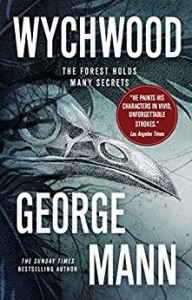 There’s a thin sliver of overlap in the Venn diagram of books that are bad and books that are compulsively readable. It’s the territory Dan Brown occupies, and it’s now got a new resident: George Mann, whose novel Wychwood is a hopeless pile of hokum that nevertheless keeps the reader eagerly turning pages until the end.
There’s a thin sliver of overlap in the Venn diagram of books that are bad and books that are compulsively readable. It’s the territory Dan Brown occupies, and it’s now got a new resident: George Mann, whose novel Wychwood is a hopeless pile of hokum that nevertheless keeps the reader eagerly turning pages until the end.
The premise of the book is sturdy enough. London journalist Elspeth Reeves has to move back in with her mom after her job and boyfriend both walk out the door. Elspeth’s mom lives in a small town that borders the Wychwood, a hunk of primeval forest of the sort Ramsey Campbell and Robert Holdstock have spent years warning us about, and as Elspeth is making her weary pilgrimage home the local constabulary – including Elspeth’s old friend DS Peter Shaw – is investigating what looks to be a ritual murder. Shaw and Elspeth renew their acquaintance as she sneaks onto the crime scene, and from there the plot gets rolling.
It turns out that the murder, the first in a series, is linked to the symbology of a local medeival legend named the Carrion King, a cross between Robin Hood, Aleister Crowley and Jason Vorhees, who slaughtered his followers in interesting and painful ways for their transgressions, and to gain ultimate power. The trick apparently didn’t work for the historical figure, but now someone is trying to recreate the legendary deaths, presumably in the interest of gaining occult power. Neither Shaw nor Reeves believes this, but there’s a disturbing sub-series of murders that seemingly couldn’t have been committed without supernatural help. Or could they?
Meanwhile, the local amateur theater group is putting on a play about the Carrion King, various local writers and scholars are working on projects about him, and the whole thing comes to a blundering climax in the middle of the titular Wychwood.
The problems with the book start with the heroine, Elspeth. She seems oddly unaffected by any of the traumas she goes through, whether it be her personal matters at the start of the book or stumbling across a gruesome crime scene. There’s no impact on her, and thus none on the reader. The characterization of Shaw doesn’t help; he’s content to trail around behind Elspeth breaking all sorts of rules. There’s an implied puppy love crush there, but the romantic chemistry barely sparks at all.
And then there’s the plot. The mystic elements of the Carrion King legend are a hodgepodge, rendering what could have been an interesting figure more irritating than anything else. The killer’s identity is obvious from the moment they’re introduced, and for an obscure myth, the Carrion King seems to have an awful lot of people up in his business. I could go on, but there’s no sense running down that stuff.
Why? Because despite all that, the book is a page-turner. Even the pickiest and most easily annoyed reader will find it hard to put down because you just want to see what happens next. A cynic would suggest a bit of schadenfreude in watching some of the less likable characters get waxed, but really, the story does move and the pages, they turn. So if lightweight reading with a hint of supernatural and gore is what you’re after, you could do a lot worse. Just accept Wychwood for what it is and don’t get frustrated by what it isn’t. That way lies madness.
(Titan, 2017)
